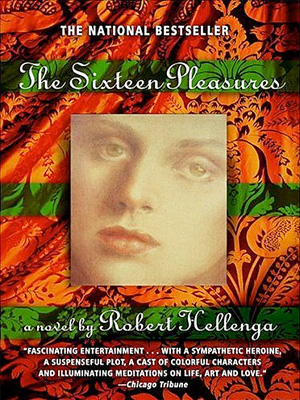| « Sean Chercover Book Release Done the Chicago Way | Bookmarks » |
Author Fri Aug 03 2012
Robert Hellenga on Fountain Pens and Much More
by Emily Schultze
Robert Hellenga, author of six novels including his debut national bestseller The Sixteen Pleasures, will be celebrating his birthday on Aug. 5. Consider this interview a small birthday celebration of this very accomplished Midwesterner.
Hellenga teaches English at Knox College and directed two programs for The Associated Colleges of the Midwest; one at The Newberry Library, which celebrated its 125th anniversary on July 1, and one in Florence, Italy. The Newberry Library made an appearance Hellenga's The Sixteen Pleasures, published in 1995 by Dell publishing (an imprint of Random House). The novel takes place in Florence circa 1966, when the Arno River flooded the city and destroyed an immense amount of art, books, homes, and relics. The protagonist, Margot Harrington, a book conservator at the Newberry Library, flies to Florence to lend a hand. There she stumbles upon a hidden copy of The Aretino, a book of erotic poems and drawings (essentially the first Kama Sutra), unscathed in the flood, much to the chagrin of the Church. Her trip takes a sudden turn toward adventure.
 The Sixteen Pleasures is so rich with detail and historically correct facts about Florence. What was your research process like for this novel?
The Sixteen Pleasures is so rich with detail and historically correct facts about Florence. What was your research process like for this novel?
I spent four weeks in Florence in 1989. I thought I'd never get the job as director of the ACM Florence programs and went to get it out of my system. But then I did get the job, and our whole family (my wife and three daughters) went back for a year in 1982-83. The girls went to Italian schools. Traumatic, but successful. The Sixteen Pleasures came later, after our oldest daughter returned to Italy to finish the last year of Italian high school with her old classmates. I had to do extensive library research on (a) the flood, (b) book conservation, (c) convent life.
How does the journal play a part in your writing process?
Mainly as a way of generating material. I'm on journal number one-hundred-and-nineteen right now. I like to free write with a good fountain pen. All the novels include a good fountain pen, and in fact, my picture was on the cover of Pen World Magazine. Small pictures of six authors who wrote with fountain pens.
So I have to ask, what kind of fountain pen do you write with?
My favorites are a Pelikan 600 Souveraïn with a custom Italian nib; an Aurora with a medium italic nib; an Aurora with a fine nib. I really like the Italic nibs, but they're more trouble to use.
Which came first while writing The Sixteen Pleasures, the story or the characters?
Characters. I got Margot on a train to Florence (prompted by my daughter's departure for Florence to live with an Italian family). Then I figured out why she was going: She was a book conservator at the Newberry Library in Chicago. They needed book conservators in Florence after the flood. I got her working in a convent library and then thought I ought to mention some of the famous books she came across. Then as a joke I put in the Aretino, which I knew about from footnotes in English literature. It was a synonym for pornography. Then a week later I realized that the book could drive the whole story. There were no known copies at the time, but a copy turned up a couple of years ago in a French pornography collection and was sold at auction for a huge amount of money.
The book is written from Margot's first person point of view. Did you find it difficult to write from the perspective of a female?
No. Never gave it a thought. I grew up on Hellenga's Corners with fourteen girls and no boys. Then I lived in a family of women for years. It seemed perfectly natural to see the world through my daughters eyes. Besides, I think it's a good time to be a young woman. The stories haven't all been written. That's what Margot discovers. Hers is an occupational story, not a love story.
It seems that your fiction is heavily influenced by your own life. Is this a deliberate or subconscious influence?
I don't know what else to do, though I extend the range of experience through research. I've never moved to Texas to raise avocados, for example. But I did go to Texas to check out the avocado scene for Philosophy Made Simple.









